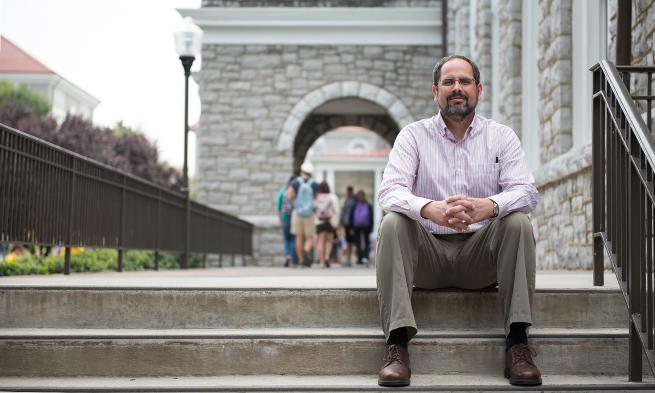Why Madison matters to me
Being the Change
The “Why Madison? Listening Tour” offers JMU alumni the opportunity to share with President Jon Alger their thoughts on why Madison matters. Pulitzer Prize-winning journalist Jeff Gammage ('82), who returned to campus in September to lecture and advise media arts and design students,offers his response. Gammage will be back at JMU during Homecoming to accept theDistinguished Alumni Achievement Award.
Madison matters to me for many reasons, but here's a big one: It was two people at JMU who taught me how to be a journalist. When the Pulitzer Prizes were announced, and The Inquirer newsroom went from expectant to chaotic, people hugging and crying and sharing champagne, I thought of Flip De Luca and Dave Wendelken, the advisors to The Breeze when I was there. It wasn't just that they were smart journalists and good teachers. It was that they gave enormously of their time and insight. Many, many nights Flip and Dave were at The Breeze when we were finishing production at 1 a.m., or 2 a.m., or later. When I talk to JMU grads, I hear about their own special mentoring relationships with particular teachers. I don't think that happens by accident. It happens because it's valued in the culture of the university. That's a rare and important thing, but it's also a fragile thing, and needs to be nurtured.
JMU has always been a place where students learn by doing, and in the world beyond college that makes all the difference. I want young people at JMU to have the same experience that I did—or better.
Does Madison matter to the state or nation? Undeniably. Its grads run corporations, discover new animals, forge paths in science, lead armies, write novels—and those are just the people we hear about. Thousands of others do important work in labs and classrooms and even at Madison itself.
Reconnecting with JMU has meant a heck of a lot to me. For too long, my main tie to the school was writing a check once a year. While it's important for all of us to send JMU a few bucks, especially in this era of diminished state funding, it was more personally satisfying to talk to students there. And to try to repay a small part of what Flip and Dave gave to me.
When to follow. How to lead.
I don't know if JMU trains people to think and work collaboratively, or if people who think and work collaboratively tend to choose JMU. Either way, the ability to work as part of a team has probably never been more important. Companies are leaner and less-staffed—certainly in the news business. That means you depend more on your colleagues, and they on you, even during the times when you might not be thrilled with one another.
I clearly remember a night at The Breeze when I had a battle over a photograph with Chris Kouba, the editor, who then and now is a brilliant guy and wonderful journalist. The next morning, we had to let go of that spat and move forward, because the success of The Breeze depended on both of us. And again it was learning by doing, the negotiation of interpersonal relations toward a larger goal.
At The Inquirer, the five reporters on the "Assault on Learning" series depended on each other for different things at different times. Kristen Graham helped me sort through months of reporting at South Philadelphia High School to find the essence of that experience. Dylan Purcell freely shared the data he had gathered on violent schools. Newsrooms can contain more than their share of people who don't play well with others, but I tend to shy from those folks, and move toward those who naturally tend to work together. It feels familiar, going all the way back to The Breeze.
